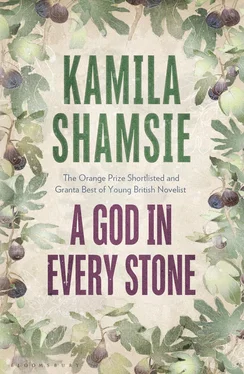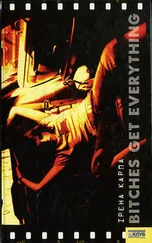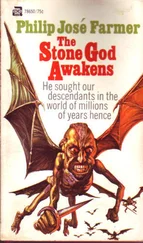The emptiness, the terrible emptiness of it, would it never leave her? For what had she betrayed that dear man, that mentor, that friend, that love? For men like Remmick. For the crumbs of their approval. Not just the whip-thin man from the War Office, but Papa, too, who even now was a shadow in her mind, telling her women didn’t understand the weighty decisions that men must make on their behalf.
The verandah doors opened and a small group of people came out, headed by one of the men who had been sitting in the deckchairs, Remmick’s wife walking beside him. Remmick turned his head at the sound of her voice, and called out, Darling, look who I found sitting out here. It’s Miss Spencer.
— She’s not still Miss Spencer, I’m sure, said his wife, walking rapidly across the garden. She looked at Viv’s hand for a wedding ring, her glance travelling to take in her unstockinged legs and Remmick’s wet clothes.
— He saved my lighter from death by drowning, Viv found herself saying, holding up the silver rectangle as though it were the guardian and proof of her chastity, and her voice was steady as the world hurtled into the cold darkness and she allowed herself to be pulled along with it towards the lights of the club building, Remmick by her side.
Najeeb wasn’t at home; he wasn’t in either of his sisters’ houses; he wasn’t in Khan Sahib’s clinic where planks of wood had been nailed to the wall to make extra beds for the wounded; he wasn’t on the very short list of those who had been taken to the English-run hospitals in the Cantonment; he wasn’t in the back room of Avtar Singh, the antique dealer’s, shop, so lost in artefacts that he was unaware his brother and nephews and brothers-in-law and the cobbler Hari Das were striding around the Walled City with his photograph in hand, knocking on doors, saying, Have you seen this man? He wasn’t with this friend or that friend or the boy he walked back from school with ten years earlier. He wasn’t at the mosque to which he never went except for Eid prayers; he wasn’t at the neighbourhood tea shop which was closed; he wasn’t at any of the places to which he might go in search of Qayyum if he were the one trying to find his brother. He wasn’t, no, that wasn’t him in the corner of Qayyum’s eye; he wasn’t the man who threw that shadow against the wall; he wasn’t the force which knocked over the mosque-reflecting mirror leaning against a tree so that it held the sky, placed clouds within reach. He was everywhere until Qayyum looked closer, and then he was nowhere.
Troops patrolled the perimeter wall, looking towards the hills where word of the massacre would have reached the tribes; six men from the Congress Party stood on the stairs of the Municipal Library, their skin red, sun-flayed — they had been made to stand there since the morning when they tried to picket a liquor shop; round the corner came the sound of a lathi striking a man’s flesh.
Qayyum kept his eyes to the ground, instructed his nephews to do the same, and moved from house to house, knocking on doors. Have you seen this man? He was wearing a frock-coat yesterday. In one of the houses a very old woman touched the photograph and said, You’re lucky to have this; my son is missing and all his father can do to try and find him is take our daughter to unveil herself in front of strangers and say imagine if she were a boy. But otherwise every house was the same: No, I’m sorry, I haven’t. Go to the Congress offices, go the Khilafat offices, that’s where they took the bodies — but Qaayum shook his head and moved on.
It was evening already by the time Qayyum crossed the square dominated by the domed structure of Hastings Memorial. Troops stood guard around it, protecting the memory of an Englishman who had died decades earlier; a group of boys, a few feet away, spat pulpy sugar cane in the direction of the soldiers. Their aim fell short, but they didn’t move closer, and the soldiers ignored them.
— Get out of here; go home.
Qayyum had hardly touched one of the boys, a gentle push to move him along, when all the boys scattered and ran, shouting Inqilaab Zindabad as if it were the chorus to a game. Qayyum walked past the monument and entered the Street of Jewellers; overhead, the flapping of a paper kite trapped in wires magnified the silence by disrupting it. Further along the street a tea-shop — Khalsa Hotel, the signboard said — was the only establishment open for business. Two long, low benches usually occupied by customers were being used as parallel tracks for a game of marbles by men whose turbans identified them as a Wazir and a Marwat — they sat facing each other, simultaneously flicking two marbles along the length of both benches, glass ricocheting off glass.
Shaking his head apologetically at the owner of the tea-shop who hurried forward to ask what he wanted, Qayyum showed the marble-players the picture which was already thinning at the corner where his finger had been gripping it all day: Najeeb at Taxila, pointing at a double-headed eagle carved in stone. The Wazir shook his head and the Marwat said he looked as if he needed to sit down, drink some tea, play a game of marbles. The owner of the tea-shop wiped his hands on the end of the turban draped over one shoulder and took the picture from Qayyum.
— I saw him. Yesterday, on the Street of Storytellers. He was wounded.
— Where? Wounded how badly?
— His shirt was all blood, I don’t know.
— Shirt?
— He’s a Khudai Khidmatgar, yes? He was wearing a red shirt, shouting Inqilaab Zindabad. I saw him, and then he went deep into the crowd, and when I saw him again two men were carrying him and his shirt was all blood, and that’s all I saw.
— No, that wasn’t him.
— No? Allah alone knows — how can our minds make sense of such scenes?
A marble bounced on the ground and came to rest beside a cat curled under the stool. The animal looked up at Qayyum, a thick film over its eyes. Beneath its paw, a green-flecked cat’s eye.
The Congress office was only a short distance from Hastings Memorial but darkness came quickly and the day had moved from evening to night by the time Qayyum approached the door from behind which there was the sound of raised voices, typewriters, a ringing telephone. He knocked several times before the door opened and a Congresswalla he knew — the lawyer, Abdul Hakim — stepped out, closing the door behind him, his exhausted expression giving way to a smile of surprising warmth.
— Qayyum Gul, I haven’t seen you all day. I was beginning to worry you were among those we lost yesterday.
— I’ve been looking for my brother. I need to see the bodies. There are some which haven’t been claimed?
He could barely understand his own words spoken with a tongue which felt sluggish in his mouth, but Abdul Hakim placed the palm of his hand against his own forehead in a way which suggested he understood better than Qayyum did.
— Please. Where are they? I need to know he’s not among them.
— We took them to the Khilafat offices yesterday evening. So that all the dead would be in one place. To make it easier for the families.
— I’ll go there, then. Thank you.
Abdul Hakim caught him by the shoulder as he started to walk away.
— We did it to make it easier for the families. We thought it would make things easier. They were in the care of the Khilafat Committee.
Qayyum didn’t know what the lawyer was trying to tell him. The Khilafat Committee in Peshawar was practically indistinguishable from Congress, the membership overlapping, anti-Imperial strategies planned and executed together.
— I’ll go there, then, he repeated; and Abdul Hakim said, I have a car; I’ll drive you.
Читать дальше












